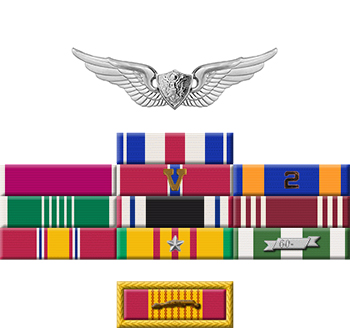Robert Pryor was born on March 25, 1941, in Oak Ridge, Tennessee. He enlisted in the U.S. Army on August 18, 1966, and completed basic training at Fort Jackson, South Carolina, in October 1966. Pvt Pryor next attended Vietnamese language training at the Defense Language Institute Support Command at Biggs Field, Fort Bliss, Texas, from October 1966 to November 1967, followed by Translator/Interpreter training at Goodfellow AFB, Texas, from November 1967 to January 1968. SP5 Pryor's first assignment was as a Translator/Interpreter with B Company of the 8th Radio Research Field Station in South Vietnam from March 1968 until he was shot down in an RU-1 Otter reconnaissance aircraft over Cambodia on February 12, 1969. After spending 28 days in captivity, President Nixon managed to get him and the other members of his aircrew released on March 11, 1969. He was briefly hospitalized to recover from his injuries at Fort Campbell, Kentucky, and then served as a Translator/Interpreter Instructor at Goodfellow AFB, Texas, from April 1969 until his honorable discharge from the Army on May 17, 1971.
His Silver Star Citations reads:
Specialist Five Robert J. Pryor, United States Army, distinguished himself on 12 February 1969 and during the ensuing period of captivity that ended on 12 March 1969, while serving on a highly classified airborne mission over the Republic of Vietnam. On 12 February 1969, the plane in which Specialist Pryor was a crew member came under hostile fire and was forced to and in hostile territory. Specialist Pryor, knowing the potential loss to the United States effort in Vietnam if the enemy came into possession of the aircraft, took up a defensive position near the aircraft. In the ensuing intense fire fight, Specialist Pryor took a determined stand with a small caliber weapon. He and his fellow crew members fought valiantly until they were sure that the sensitive aircraft had been destroyed. After the aircraft's destruction, they continued to fire at the enemy in the hope that the numerically superior force could be held at bay until rescue attempts could be undertaken. Finally, out of ammunition, Specialist Pryor and his fellow crew members were captured. Specialist Pryor, after capture resisted all interrogation concerning his mission or activities aboard the aircraft. Specialist Pryor's extraordinary heroism in close combat against a numerically superior Viet Cong force and his silence in the face of enemy interrogation was in keeping with the highest traditions of the military service and reflects great credit on him, his unit, and the United States Army.
|



